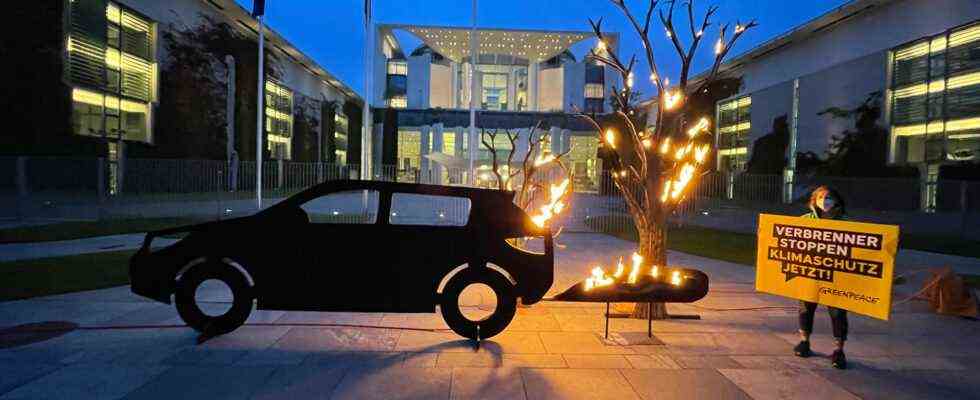Status: 03.09.2021 1:42 p.m.
For Greenpeace and Deutsche Umwelthilfe, the climate-friendly restructuring of many corporations is not going fast enough. You want to force German carmakers and an oil company to do more climate protection.
Greenpeace and Deutsche Umwelthilfe (DUH) are demanding more climate protection from the German car manufacturers BMW, Daimler and BMW as well as the oil and natural gas producer Wintershall Dea – and are taking this claim to court. The companies must “significantly accelerate the climate-friendly restructuring of their companies”, declared the two environmental protection organizations at a joint press conference. If necessary, the corporations should be forced to give in with lawsuits.
The proceedings against VW will be conducted by Greenpeace, and if necessary, the DUH will sue BMW, Mercedes and Wintershall Dea. Both organizations are of the opinion “that the current and planned measures of the four corporations contradict the climate goals of Paris and are therefore illegal”. Remo Klinger, attorney at DUH, underlined that, according to the associations, the car companies have not yet invested enough in climate protection. With regard to the exit from the internal combustion engine, there are only announcements for the distant future. “There is no binding exit date.”
“Punishable and bindingly obligate”
Greenpeace and DUH want to change that now. Both organizations therefore take civil law action against property, health and civil rights violations. The aim is for the car companies to “commit themselves under penalty of punishment and bindingly not to put any more combustion engines on the road after 2030”.
Wintershall Dea is one of the largest fossil fuel companies in Germany and Europe, which is clearly acting against the Paris climate targets, it said. According to the assessment, there is a remaining CO2 emissions budget that must not be exceeded from the Paris climate protection agreement. Therefore, the demand is that the group should no longer be allowed to develop new oil and gas fields by 2026 at the latest.
“Despite increasing extreme weather events and contrary to scientific findings, the German auto industry continues to sell millions of climate-damaging diesel and gasoline engines worldwide,” the associations accused the carmakers of.
“Levering the predator lobbyism”
First of all, the corporations can undertake to comply with the demands of the associations themselves by means of a declaration of discontinuance. If, however, they refuse, a lawsuit will be filed with the regional courts after a period has expired. At VW, the deadline runs until the end of October, and at the other companies until September 20, it was announced.
“Civil law can and must prevent corporations from destroying our livelihoods and depriving our children and grandchildren of the right to a secure future,” said Roda Verheyen, Greenpeace’s lawyer. In the case of car companies, there is no insight into changing direction, says DUH managing director Jürgen Resch: “With our complaints we will undermine the predator lobbyism of the auto industry against climate protection,” he announced.
Problem or solution?
DUH and Greenpeace see a decisive basis for their complaints in a decision by the Federal Constitutional Court that caused a sensation a few months ago. The court had ruled that the German Climate Protection Act from 2019 was partially incompatible with fundamental rights. The constitutional judges had complained that there were insufficient specifications for reducing emissions from 2031.
“Anyone who delays climate protection harms others and is thus acting illegally,” said Greenpeace attorney Verheyen. This has been clear since the decision of the Federal Constitutional Court in March and this also and especially applies to the German auto industry with its “gigantic” global carbon footprint .
Critics and climate activists have long accused the auto industry of presenting itself as part of the solution to the climate problem when it is actually the problem. But protests and lawsuits from environmental organizations and committed citizens have long been directed against other companies that are considered to be contributing to global warming.
Tailwind from the Shell ruling
For example, the Shell oil company was convicted of a lawsuit brought by environmentalists Reduce CO2 emissions by 45 percent by 2030. Shell must “do its part in the fight against dangerous climate change”, so the decision of the judges. With its business, the company is contributing to the “dire” consequences of climate change for the population and is “responsible” for enormous amounts of greenhouse gases emitted.
DUH and Greenpeace believe in a success: “With the Shell judgment from The Hague we have a tailwind”, emphasized Martin Kaiser, Managing Director of Greenpeace. However, the judgment is not final. Shell is appealing the court decision.
Climate protection: Greenpeace and Deutsche Umwelthilfe are suing Daimler, BMW, VW and DEA
Christopher Jähnert, ARD Berlin, 3.9.2021 12:28 p.m.

